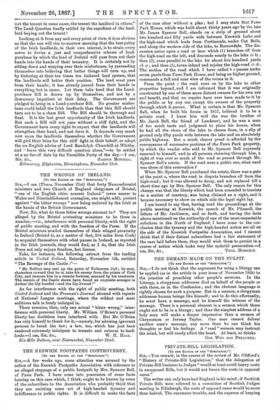THE DEMAND MADE ON THE PULPIT.
[To THE EDITOR or TEX "BeRcrxros."J do not think that the argument for using a liturgy can be applied (as in the article in your issue of November 19th) to the praotice of preaching other people's sermons. In the Liturgy, a clergyman addresses God on behalf of the people or with them, as in the Confession ; and the choicest language is rightly chosen for such a purpose. But in a sermon, a clergyman addressee human beings like himself; and to do this effectually, he must have a message, and be himself the witness of the message. There is a personal element in a sermon which there ought not to be in a liturgy ; and thus the simplest address of a holy man will make a deeper impression than a sermon of Chrysostom or Jeremy Taylor. One man cannot deliver another man's message, any more than he can think his thoughts or feel his feelings. A " read " sermon may instruct the mind, but will rarely affect the heart. At least, so thinks
ONE WHO HAS PREACHED.










































 Previous page
Previous page